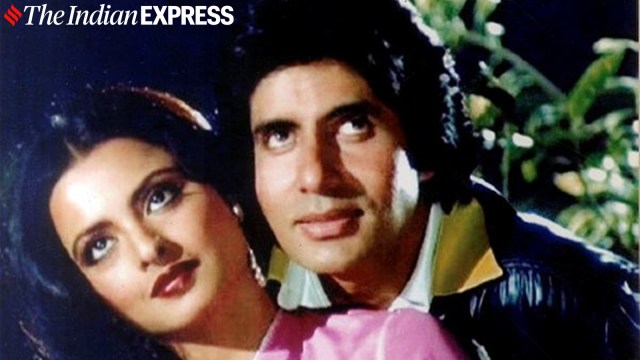📣 For more lifestyle news, click here to join our WhatsApp Channel and also follow us on Instagram
‘He gave me an…’: When Rekha spoke about what she considers the greatest compliment Amitabh Bachchan ever gave her; how working with someone you admire changes you
Rekha and Amitabh Bachchan’s pairing became symbolic of a golden era in Hindi cinema.
 Rekha and Amitabh Bachchan in film SILSILA. (Source: Express archive photo)
Rekha and Amitabh Bachchan in film SILSILA. (Source: Express archive photo)Amitabh Bachchan and Rekha’s electrifying on-screen chemistry, especially in Silsila (1981), has long fascinated audiences — fuelling conversations, headlines, and speculation for decades.
While Silsila remains their most iconic and talked-about film, the duo shared the screen in several other hits that captured their effortless rapport including Muqaddar Ka Sikandar, Suhaag, Do Anjaane and Ram Balram. Their pairing became symbolic of a golden era in Hindi cinema.
But beyond the characters and camera lenses, Rekha once opened up about something more personal — how working closely with a co-star over many years can shape you. In an interview with Rediff marking her 25 years in the film industry, Rekha reflected on her journey and shared insights that resonate beyond fame. “Look, when we started working together, we were at a very impressionable stage. Each one left his or her impression on the other. If you saw a crowd in those days from a top angle, you just saw a whole sea of heads with the Amitabh hairstyle,” she said.
Whether traces of Bachchan’s style showed in her performances, she admitted, “I don’t deny it.” Recalling a moment of critique, she added, “I agreed with him,” when told she had mimicked Bachchan in Madam X. She also revealed what she considers the greatest compliment he ever gave her: “I think the only compliment he has knowingly or unknowingly paid me was that he gave me an opportunity to work with a great co-star like him. That is the biggest compliment I have ever received.”
How common is it for people, especially during impressionable stages in life, to adopt traits, mannerisms, or styles from those they work closely with?
Jai Arora, counselling psychologist and co-founder of Kirana Counselling, tells indianexpress.com, “It’s incredibly common, more than we realise, for people to unconsciously adopt little things from those around them. A way of laughing, a dressing style, even how someone pauses mid-sentence. When we’re at an impressionable age or stage, like starting a new job, falling in love, or entering the public eye, we’re like soft clay, and you also want to be assimilated into the existing circle and be liked. We absorb. And often, the people who leave the biggest imprint are those we admire the most. And in creative fields where energy constantly bounces off each other, it’s natural to start carrying echoes of someone else’s presence. It’s not imitation, it’s influence.”
Why do some people perceive being included, trusted, or collaborated with as more meaningful than verbal praise?
For many of us, being chosen — being seen, included, collaborated with — feels far deeper than any spoken admiration. Especially when it comes from someone we look up to. It says, ‘I trust you. You belong beside me.’ “That unspoken respect stays with us long after the project ends. This can also sound like a mark of respect and validation of your work or character, that ‘you’re in the inner circle now,’” explains Arora.
Can influence from admiration or proximity ever blur one’s sense of individual identity, or can it strengthen it?
“Both are possible,” says Arora. “Once a certain version of you gets social validation, it is easy to associate the limelight or attention to that trait only and not you as a whole. And hence, when, not if, with time one would change, this can feel like a loss of identity.”
But more often, admiration just adds layers — it lets us experiment, try on someone else’s strength, rhythm, or poise until we find what feels like “us.”
📣 For more lifestyle news, click here to join our WhatsApp Channel and also follow us on Instagram
Photos





- 01
- 02
- 03
- 04
- 05






















